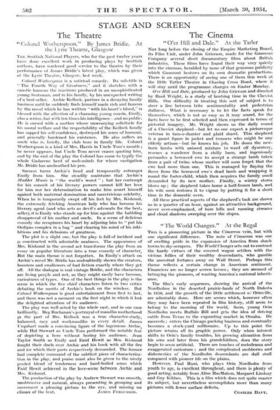" The World Changes." At the Regal
Tins is a pioneering picture in the Cimarron vein, but with one significant difference. The note of Cimarron was one of swelling pride in the expansion of America from shack towns to sky-scrapers. The World Changes sets out to contrast the hardy virtues of the covered wagon settlers with the vicious follies of their wealthy descendants, who gamble the ancestral fortunes away on Wall Street. Perhaps this theme reflects a certain change in American sentiment. Financiers are no longer screen heroes ; they are accused of betraying the pioneers, of wasting America's national inherit- ance.
The film's early sequences, showing the arrival of the Nordholms in the deserted prairie-lands of North Dakota in 1856, and the growth of the little settlement of Orinville, are admirably done. Here are scenes which, however often they may have been repeated in film history, still seem to belong to the morning of the world. Soon, young Orin Nordholm meets Buffalo Bill and gets the idea of driving cattle from Texas to the expanding market in Omaha. He succeeds ; enters the Chicago packing business and eventually becomes a stock-yard millionaire. Up to this point the picture retains all its graphic power. Only when interest shifts to Orin's family troubles, his growing alienation from his sons and later from his grandchildren, does the story begin to seem artificial.. There are touches of melodrama and exaggerated caricature ; and the complicated snobberies and dishonesties of the Nordholm descendants are dull stuff compared with pioneer life on the plains.
However, Paul Muni, who plays Orin Nordholm from youth to age, is excellent throughout, and there is plenty of good acting, notably from Aline MacMahon, Margaret Lindsay and Guy Kibbee. This is a film which does not quite master its subject, but nevertheless accomplishes more than many pictures with fewer surface defects.
CHARLES DAVY.








































 Previous page
Previous page